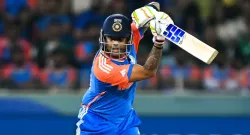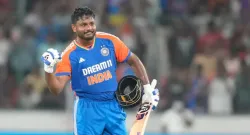
Credit: X
Cricket supporters will be witnessing the Champions Trophy, which will return after eight years with its 2025 edition to be held in Pakistan and the United Arab Emirates. Back in 1998, when the distinguished ODI tournament started in Bangladesh in 1998, it was known as the Knockout Trophy. The competition started with the participation of full-time International Cricket Council (ICC) members.
In the inaugural edition, the match started with the preliminary match between New Zealand and Zimbabwe at the Bangabandhu National Stadium. After New Zealand’s five-wicket victory, the tournament advanced to the quarter-finals where eight teams were tasked to battle against each other to reach the semis. After the semis, the remaining two sides locked horns in the final. Those days, the tournament was also known as the mini-World Cup.
South Africa and New Zealand clinch their maiden ICC titles
South Africa beat West Indies by four wickets in the final played in Dhaka and became the first champions of the illustrious 50-over tournament. The Proteas' victory also marked their first title achievement in ICC tournaments. After two years, the tournament made a comeback with its second edition, held in Kenya. This time, a little change took place as the last six-ranked teams faced each other in the pre-quarter finals, with India facing the hosts Kenya, Sri Lanka struggling against the 1998 runners-up West Indies, and England vying against Bangladesh.
India, Sri Lanka, and England tasted success and qualified for the quarter-finals. The Sourav Ganguly-led India, who kicked off their journey in the pre-quarters, played a fierce brand of cricket and reached the final. However, New Zealand held their nerves on the big day and pulled off the trophy, by handing the Men in Blue a four-wicket defeat. After the Proteas, the Kiwis also won their maiden ICC tournament with their mind-boggling win under Stephen Fleming’s captaincy.
ICC Knockout Trophy became ICC Champions Trophy from 2002
In 2002, the term Champions Trophy was used for the first time and the Knockout Trophy got the new name and the format also completely changed as 12 teams were allowed in the competition, played in Sri Lanka. These 12 sides were divided in four pools with three sides in each group. Sourav Ganguly-captained India, the previous edition’s runners-up, quenched their thirst for the title after sharing the trophy with the Sanath Jayasuriya-led Sri Lanka after the final in Colombo washed out twice.
The same pattern continued in 2004 and England, who were hosting the tournament for the first time, looked magnificent under Michael Vaughan. However, their confidence shook in the last stage of the event while defending 217 runs against West Indies in the final held at the iconic Oval. Under Brian Lara’s leadership, the Windies side lifted the trophy.
Australia became the most-successful team in the marquee ODI tournament
India hosted the competition in 2006 but it was Australia that repeated their 1987 World Cup performance to win the competition. The Aussie side led by Ricky Ponting vanquished the defending champions West Indies in the final held in Mumbai. In the 2009 edition in South Africa, the Aussies continued their dominance and defended the title with their six-wicket triumph against New Zealand in the final at the SuperSport Park. With the scintillating success, Australia also became the first side to win two consecutive Champions Trophy editions. The record is still untouched as India, who won the 2013 Champions Trophy installment, choked in the 2017 edition's final.
India equals Australia's feat of clinching two titles; Pakistan opened their account in 2017
The Champions Trophy returned to England in 2013, after nine years. India, studded with young players, beat the hosts England by five runs to equal Australia’s record of two titles. MS Dhoni played a vital role in the notable achievement as he became the only captain to win all major ICC trophies. The 2017 Champions Trophy saw India’s reign again under Virat Kohli’s captaincy but they lost their nerves in the final against Pakistan, who outclassed the Men in Blue at the iconic Oval. Sarfaraz Ahmed’s leadership got Pakistan their first Champions Trophy title.




